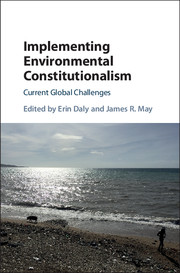
-
Select format
-
- Publisher:
- Cambridge University Press
- Publication date:
- 02 November 2018
- 08 November 2018
- ISBN:
- 9781316691588
- 9781107165182
- Dimensions:
- (228 x 152 mm)
- Weight & Pages:
- 0.49kg, 248 Pages
- Dimensions:
- Weight & Pages:
You may already have access via personal or institutional login
Book description
Constitutions can play a central role in responding to environmental challenges, such as pollution, biodiversity loss, lack of drinking water, and climate change. The vast majority of people on earth live under constitutional systems that protect the environment or recognize environmental rights. Such environmental constitutionalism, however, falls short without effective implementation by policymakers, advocates and jurists. Implementing Environmental Constitutionalism: Current Global Challenges explains and explores this 'implementation gap'. This collection is both broad and deep. While some of the essays analyze crosscutting themes, such as climate change and the need for rule of law that affect the implementation of environmental constitutionalism throughout the world, others delve deeply into geographically contextual experiences for lessons about how constitutional environmental law might be more effectively implemented. This volume informs global conversations about whether and how environmental constitutionalism can be made more effective to protect the natural environment.
Contents
Metrics
Altmetric attention score
Full text views
Full text views help Loading metrics...
Loading metrics...
* Views captured on Cambridge Core between #date#. This data will be updated every 24 hours.
Usage data cannot currently be displayed.
Accessibility standard: Unknown
Why this information is here
This section outlines the accessibility features of this content - including support for screen readers, full keyboard navigation and high-contrast display options. This may not be relevant for you.
Accessibility Information
Accessibility compliance for the HTML of this book is currently unknown and may be updated in the future.


